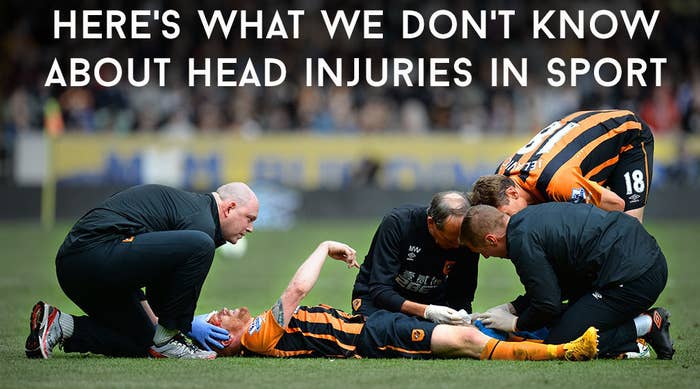
Could playing contact sports at school lead to dementia? People in Britain are increasingly worried that it could. It comes in the wake of a years-long controversy in the US.
Last month a group of 70 British doctors and academics called for a ban on full-contact tackling in school rugby.
Among the things they're worried about is repeated brain injury caused by tackling – the petition says, "A link has been found between repeat concussions and cognitive impairment."
It has also been suggested that football players have come down with Alzheimer's caused by years of heading the ball.
In the US, the concern is much more high-profile and has been widely reported. It's even been the subject of a 2015 Hollywood film, Concussion, based on the real-life story of Dr Bennet Omalu, a neuropathologist who found that some retired players had patterns of deterioration in their brains that were similar to those found in Alzheimer's patients. The NFL ended up paying a $1 billion settlement to former players after playing down the fears, and only acknowledged a link in March.
Specifically, concussion and "mild brain trauma" have been linked to a condition called chronic traumatic encephalopathy, or CTE.
CTE is described as a progressive degenerative disease caused by repeated head trauma, in which an abnormal protein called tau builds up in the brain and causes memory loss, impaired judgment, depression, and a range of cognitive problems, leading eventually to dementia.
So far, there's no way to diagnose it in living people – only in the brains of dead people.
Sport-related cognitive problems were first noticed in former pro boxers in the early 20th century, and were described as "dementia pugilistica", or boxer's dementia.
Most of the research into CTE has been carried out by a group at Boston University.
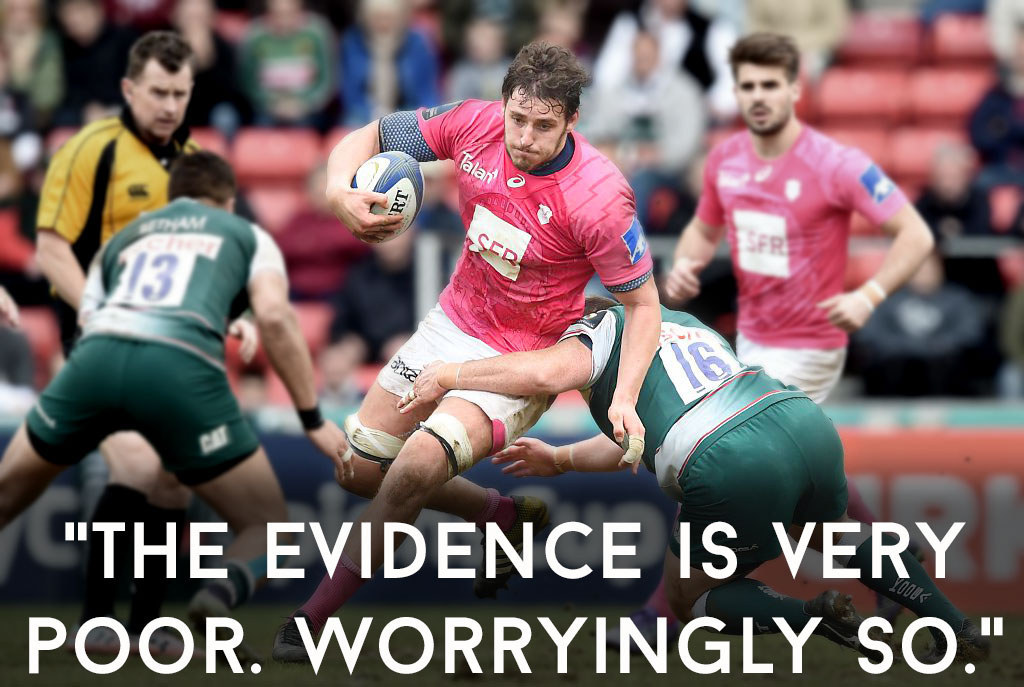
But while CTE has had a lot of attention, several scientists have told BuzzFeed News that, so far at least, there is a severe shortage of good scientific evidence.
Almost all the research into CTE has been case studies of dead sportspeople's brains. But that can't tell us about how common it is, or what causes it. So far, there has been very little in the way of larger-scale studies that look at the links between head injury and cognitive problems.
"We need to know how common CTE is in people who've had head injuries compared with people who haven't, to determine if concussion increases the risk," says Professor David Cassidy, an epidemiologist at the University of Southern Denmark who has studied head injuries and dementia. "To date, there are no studies that do that. There isn't enough evidence to date to say concussions cause CTE."
Cassidy has himself carried out two reviews of the literature, looking at all the studies in the area. His latest found only one good-quality study that looked at the question, which "identified no evidence … of an increased risk of dementia". His earlier one looked at three more, and was inconclusive.
Another review, published last year and looking at every reported case of CTE, found that there was a severe shortage of good research and said that "the reporting of CTE in former professional American football players has led to widespread speculation far beyond the conclusions that can be drawn … there is no credible data with which to establish the incidence or prevalence of CTE in former contact sport participants."
Professor Alan Carson, a neuropsychiatrist at the University of Edinburgh and lead clinician at the Scottish Brain Injury Rehabilitation Service, agrees, telling BuzzFeed News that the evidence so far is "very, very poor. Worryingly so, actually. And it is a major source of concern to us."
Chris Nowinski, a co-founder of the Boston University CTE programme, disagrees. He points to a Mayo Clinic study, published last year, that autopsied the brains of 66 athletes and 148 non-athletes, finding no cases of CTE in the latter but 21 in the former. "That is evidence," he tells BuzzFeed News. "That is strong evidence, but not perfect evidence." Carson says that this study is unblinded and lacks quality control, and makes no effort to look at other possible causes beyond contact sport.
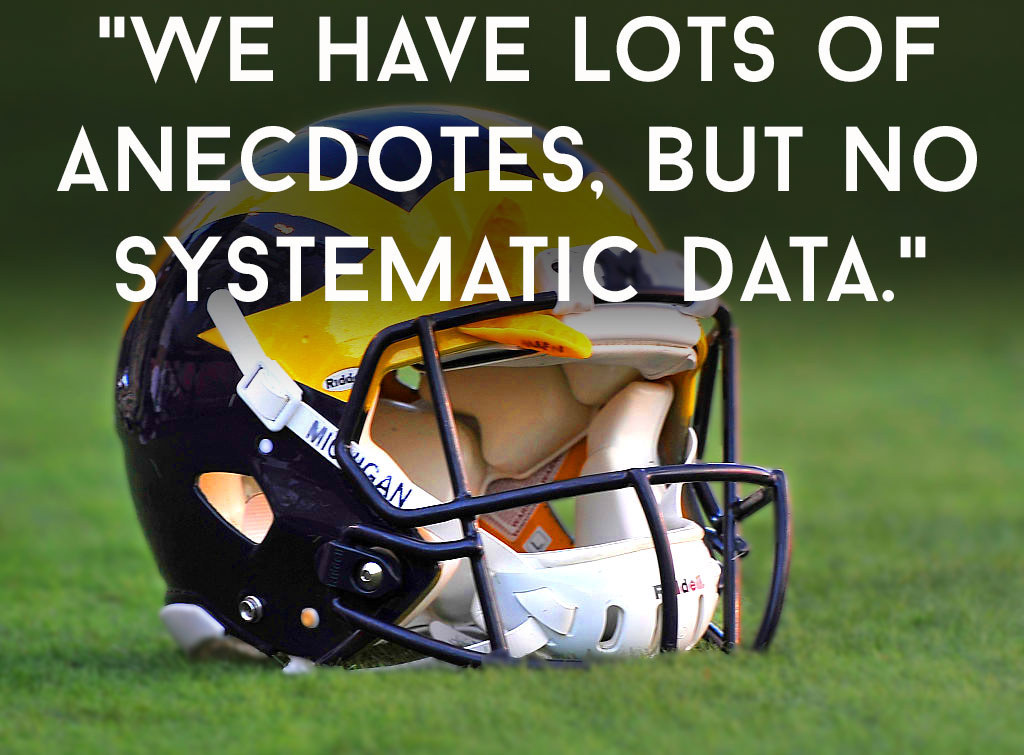
That means it's far too soon to tell whether or not brain trauma causes CTE at all.
Professor John Hardy, a neuroscientist at University College London, tells BuzzFeed News that there isn't enough evidence to draw a causal link. "We have a saying in science, that the plural of anecdote is not data," he says. "We have lots and lots of anecdotes but no systematic data.
"We can say that there is enough data for us to be worried, but we don't have a clear idea of how much damage is happening."
Cassidy agrees: "I think the Boston group has done some important work, they raise important hypotheses, but there's been a tendency for their results to be overstated. You can't take them as evidence of increased risk."
Part of the problem is that there haven't been very many diagnosed cases of CTE, and the ones that have been identified tend to be in brains that have come from people who were suffering cognitive problems.
There have been around 150 cases of CTE seen in autopsied brains, most of them at the Boston CTE unit.
A PBS article reporting on their work attracted a lot of attention last year when it said that the brains of "87 out of 91 former NFL players have tested positive" for the disease.
But, as the article admits, that's unlikely to be a representative sample. "There is a bias in the way most of us are getting these brains; we get them from people who have had issues," Professor Lili-Naz Hazrati, a neuropathologist at the University of Toronto who has seen 22 cases of CTE, tells BuzzFeed News.
What she means is, if you've spent a sporting career being hit in the head, and later in life you suffer cognitive problems, you might – reasonably – wonder if there's a link. That means that you might be more likely to donate your brain to places like Boston. And that, in turn, means that the brains that turn up for autopsy are more likely to show symptoms.
That is an example of selection bias, a way that the data could be "confounded" and untrustworthy, although researchers in Boston say they've done their best to account for this.
Hardy agrees that selection bias is "a huge problem": "People who have neurological illness will always remember head injuries, and people who haven't tend not to remember them."
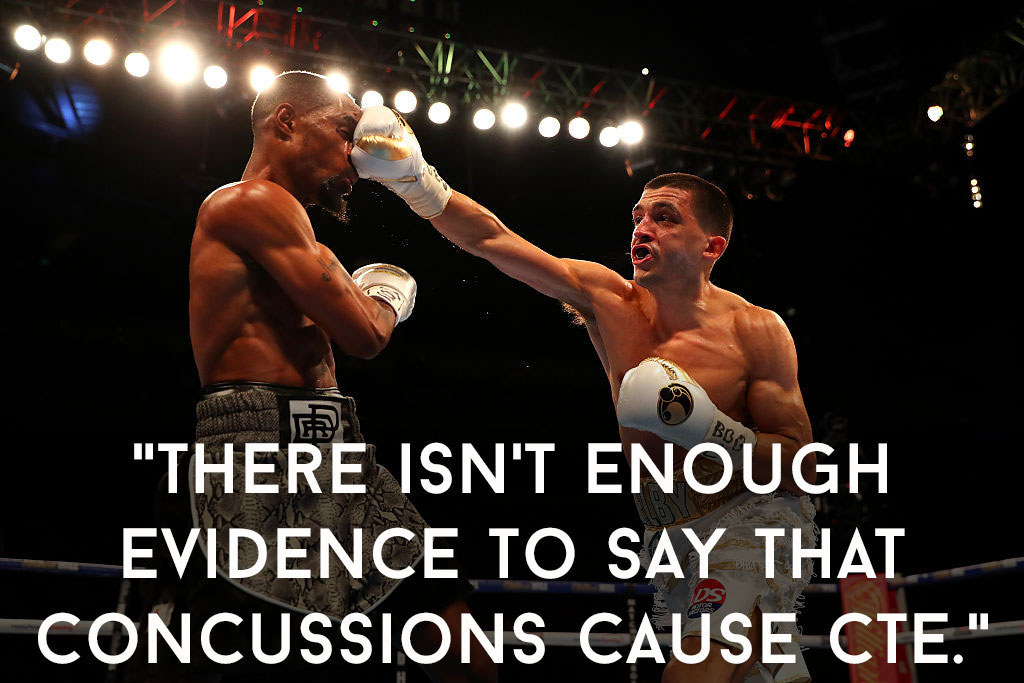
There may be other confounding factors as well, such as drug or alcohol use.
The original cases of "dementia pugilistica", says Carson, were diagnosed in ex-professional boxers who toured fairgrounds offering bare-knuckle fights. "They were drinking whisky all the time, receiving blows to the head that you don't usually get in amateur sport," he says.
Excessive alcohol use, he says, is a known risk factor for dementia. He thinks that drug abuse among some sportspeople may play a part, too. "We know that steroids are neurotoxic," he says.
Cassidy agrees: "If you have an autopsy on a football player who's killed himself, and has been in chronic pain since retiring and been abusing drugs, it's possible that those could be contributing to any kind of tauopathy or CTE." Neither he nor Carson is aware of any studies that have been done that control for these confounding factors.
Another problem is that it's not yet 100% clear what CTE is, exactly.
The diagnostic definition – what makes it different from other brain diseases caused by tau protein, such as Alzheimer's, or less well-known conditions like progressive supranuclear palsy – is still something of a work in progress.
"The distribution and the look of the tau tangles are a little bit different in CTE," says Hazrati. "In clear cases, in the younger ones, you can distinguish them. But when you start getting into the older population, when they have a history of concussion and have Alzheimer's on top of it, it's much harder."
"Pathologists don't agree what it is," says Carson. "The changes that it describes overlap with those seen in normal ageing, and in early-onset dementia." Hardy is a bit more positive – "That's a bit pessimistic," he says. "We're in the early stages of working it out."
Nowinski points to a National Institute for Neurological Disorders and Stroke meeting of pathologists last year that showed "good agreement" on the signs of the disease. Carson calls the resulting paper "poor", saying that the pathologists in the study were "told in advance how to code, and that it is a study of CTE – i.e. they are pre-primed". In a real-world setting, he says, the agreement "would be far less".
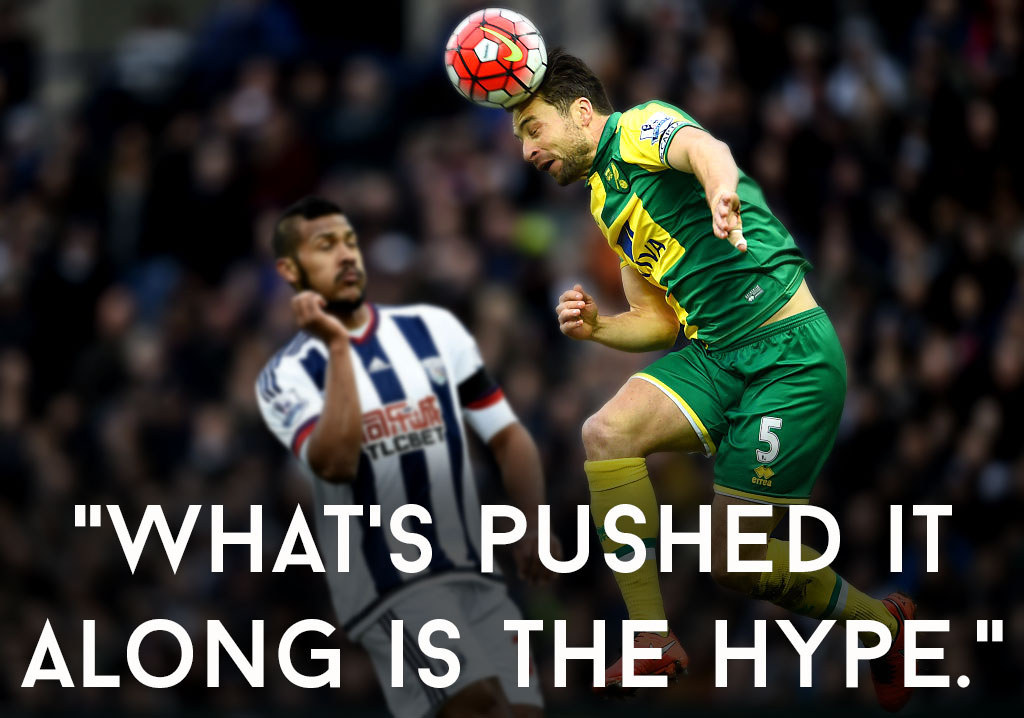
The scientists are concerned that the CTE story so far has been driven by "hype", rather than science.
"What's pushed it along is the hype, especially in America," says Cassidy. "When you throw into the mix the publicity in USA and Canada, and the lawsuits, and a movie, and reports in the media, this is what you get."
Carson in particular is dismissive of "science by press release", and gives the example of the PBS article, which was based on data given to the authors by Boston University but apparently not published in any scientific journal.
"It is not clear where that data comes from, or how anyone else can subject the findings to scrutiny," he says. "There are lots of press releases out of Boston, but I've not seen it in the public domain yet.
"There's a lot of ropey science going on. My general rule is that when you see the issue being played out in the media before the journals, it's always a thinner case than it's made out to be."
And, they say, the reaction may have negative consequences.
Hazrati tells a story about a brain she dissected recently, belonging to Todd Ewen, a 49-year-old ice hockey player who retired in the 1990s. He was a fighter, a player on the team who deliberately gets into brawls with opponents, and suffered multiple concussions. He didn't have the usual symptoms of CTE, but did develop depression, which has also been linked with traumatic brain injury.
"That depression led to a suicide," Hazrati says. "He started believing he had CTE and that he was going to become a burden to his family." The family made the case public because they "thought it was important that people realised that, even if people have these general symptoms, they shouldn't jump to the conclusion of CTE". When she dissected his brain, she found no evidence of CTE.
The publicity, she says, "has caused a lot of distress, not just in athletes, but among kids and parents, and it's led to a lot of self-diagnosis among people who've had concussions and are having a bad time in life". She thinks that "it's important that we don't diminish the impact of concussion on brain health, but we should add the disclaimer that we're not there yet" on the evidence.
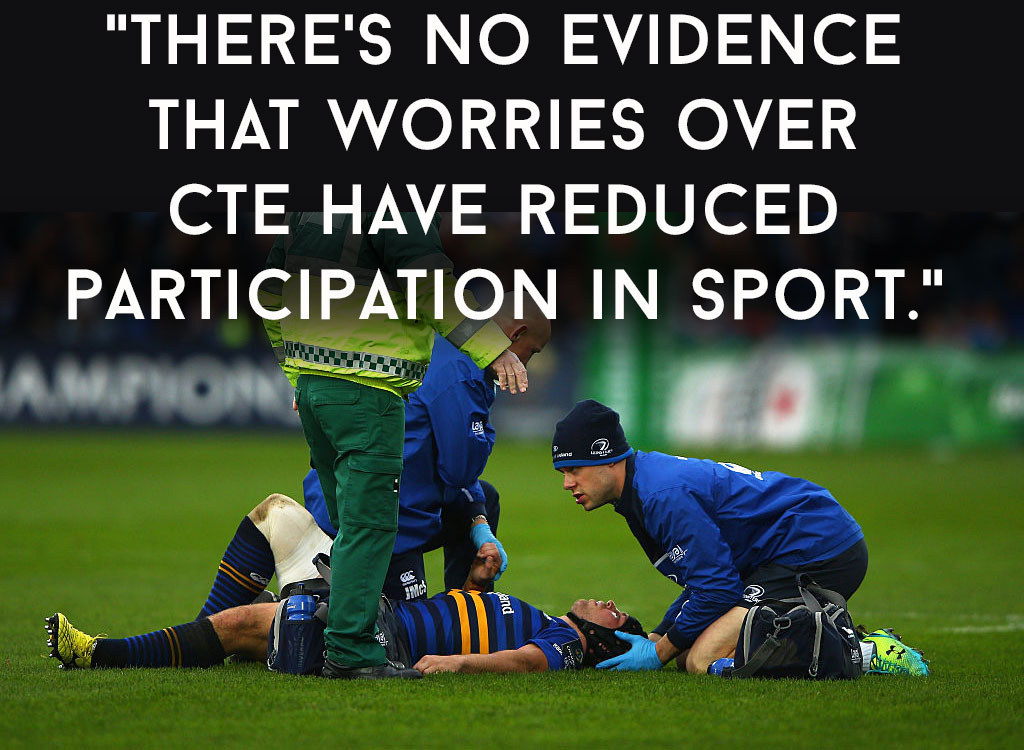
They're worried that it might put people off taking up sport, out of concern for their safety. But exercise is known to protect against cognitive problems like dementia, among many other things.
"If we want our kids to avoid dementia, we should do everything we can to encourage them into sport," says Carson. "That is evidence that is compelling and strong.
"If you tell a load of parents that if your kid plays rugby, they'll get dementia, the parents will say, 'Well, hang on.' But we should be telling them that exercise prevents dementia."
Hardy agrees: "We shouldn't expose children to unnecessary risk, whether that's the risk of head injury or the risk of sitting on your arse watching television.
"There's a danger of overreaction. I'm overweight and 60, with type 2 diabetes, and we're getting more and more people like me. We don't want everyone sat in front of the telly or in front of the computer." Hazrati, likewise, says: "It may actually reduce the level of exercise in kids, because parents are afraid of putting their kids at risk of concussions."
Nowinski disagrees strongly. "I'm always amused by this," he says. "This is when scientists who criticise us for having no evidence truly have no evidence.
"There is no scientific evidence that this has hurt sport in any way, shape, or form. The reality is that participation in youth tackle football in America is up 1.9% last year, despite this public conversation about CTE."
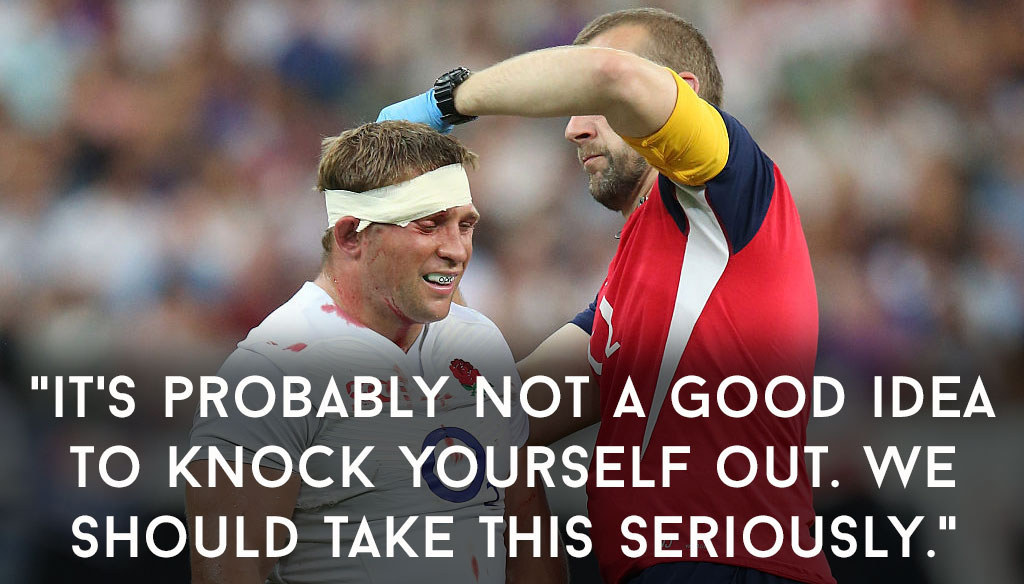
None of the scientists thinks that head injuries are a good thing. But they say it is important to find the right balance between alerting people to possible risks on the one hand, and unnecessary scaremongering on the other.
"We can all agree that head injury is never a good thing," says Cassidy. Hazrati and Hardy both think that there probably is a causal link between head injury and CTE.
Carson also says that children, especially, shouldn't be needlessly exposed to head injuries. "It's probably not a great idea to knock yourself out. I'm not trying to dismiss concerns; we should take it seriously," he says.
"But mild brain injury is the commonest reason for hospitalisation for under-65s in the UK. If having a mild head injury really caused dementia in the way that some of the more extreme claims have it, there wouldn't be a cognitively able person in Britain."
Banning tackling in school rugby out of fear of head injuries would be "hugely premature", says Carson, although he says that it's important that teachers recognise the symptoms and that players are immediately withdrawn if there is a suspected concussion.
While the evidence for a link so far is thin, Hardy is impressed with how rugby, in particular, is taking the risks seriously. "The Saracens rugby team approached me," he says. "They and the Rugby Football Union (RFU) have been determined not to bury their heads in the sand, as the NFL did. There's room for an evidence-based response to this and they're trying to do that. I've been very impressed." He's putting a research programme together with Saracens and the RFU.
All of the scientists say that the important next step will be big, epidemiological studies, as well as properly controlled longitudinal trials, to understand how common CTE is in the population – "We have no idea of the prevalence," says Hazrati – and to work out what the causal relationship is with head injury.
